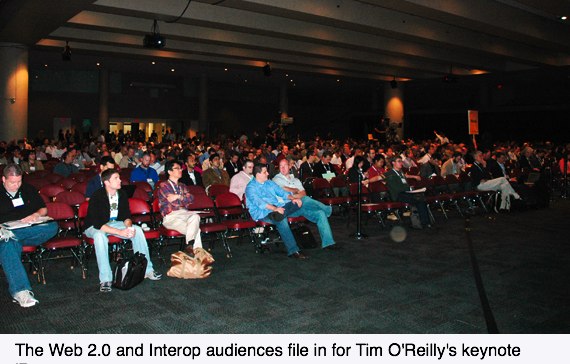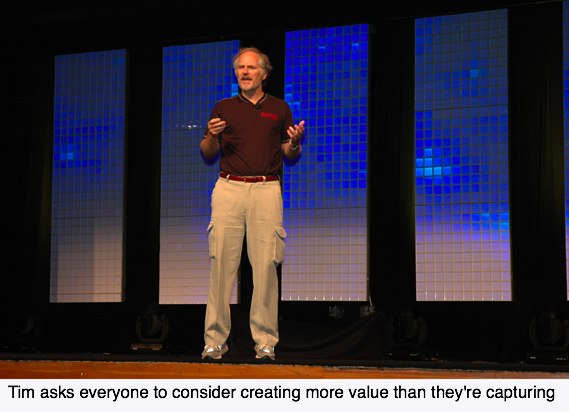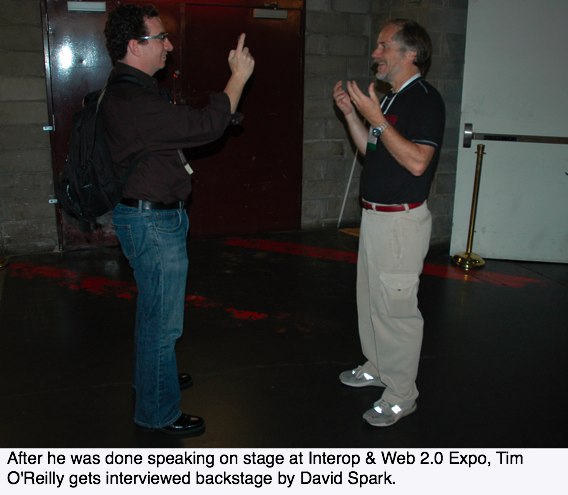I was live blogging Tim O'Reilly's keynote here at Interop and Web 2.0 Expo when FireFox "unexpectedly quit" according to the error dialog. So, I've relaunched and will attempt to capture some of what I lost. O'Reilly is on stage (photo below) talking about two major themes: First, how Web meets World and secondly how to create more value than you're capturing. "You better be working on something that can really make a difference" he just said (as my system was recovering).

I was live blogging Tim O'Reilly's keynote here at Interop and Web 2.0 Expo when FireFox "unexpectedly quit" according to the error dialog. So, I've relaunched and will attempt to capture some of what I lost. O'Reilly is on stage (photo below) talking about two major themes: First, how Web meets World and secondly how to create more value than you're capturing. "You better be working on something that can really make a difference" he just said (as my system was recovering).I took the photo below just before Interop general manager Lenny Heymann took the stage to introduce Tim O'Reilly.

In terms of Web meets world, O'Reilly started about how the next wave of Web 2.0 is all about sensors and ambient computing (the kind of computing that happens on our behalf while we're away from our desks).

O'Reilly gives a lot of examples about how we're surrounded by sensors. For example, he says, pretty much all cameras are sensors. He talks about how Macs have motion sensors in them and a bunch of Stanford students have built a distributed network of Macs that can sense and measure earthquakes. That network is called QCN or Quake Catcher Network and any Mac can join the network by installing a download. This reminds me of the SETI project and the search for extra-terrestrial life by way of downloaded screensavers than run on computers all over the world that, while saving screens (something they really don't do anymore), are also crunching signal data gathered from the universe.
He continues to talk about some of the work being done all around that he finds worthwhile and bridges over to some examples of web sites and other projects and startups that he doesn't see a lot of value in. He doesn't pick on any serious ventures (he picks things whose creators wouldn't be insulted). But he implies that these are examples of things where real value isn't being created. This serves as the launchpad for his next point which is to work on something worthwhile. He spends the rest of his time on stage asking that people think hard about creating more value than they capture because the alternative will plunge us into a word that we'll deeply regret.
To make his point, he talks about Pascal's Wager which essentially suggests that you live your life as though there is a God, and if it turns out that there isn't a God, then that's OK because you've lived a good life.
This is an important point in terms of creating more value than you capture and O'Reilly connects it to the one theme that instantly rises to the top of mind when you think about where that applies: global warming. O'Reilly says to forget about whether the people who say global warming is happening are right or not and suggests to live as though they're right and the world will come out ahead anyway.
He uses the recent collapses on Wall Street as examples of where a lot of people captured way more value than they created and how, when things are so out of balance like that, the end result can be disastrous (as it has been).
This was about the time that Firefox unexpectedly quit on me so a lot of what you just read is a reconstruction from memory of what I had already written (minus exact quotes). By the time I recovered, he was closing with how imporant it is to do something that matters and to make a difference and to create more value than you are capturing, no matter what you are working on.
While my system was recovering, he was citing some examples of how each and every one of us can make a difference and, referring to energy saving IT, he gave a shout out to Energy Camp (Thanks Tim!) which we just ran here as a part of Interop a couple of days ago. Yes, any one can join the Energy Camp community.
Tim closes by talking about one more way people can make a huge difference: Vote. He notes how he is a supporter of Barak Obama (and gets huge applause as a result) and how some of John McCain's behavior in terms of changing positions on certain issues really concerns him. But he doesn't push as hard on who to vote for as he pushes on the idea of informing yourself on the issues and making a choice that you believe in. He does an audience check to see how many of the people in the audience are registered to vote (most but not all raise their hands) and then asks how many of the people who are left are going to register, tomorrow and suggest going to Rock The Vote in case you don't know where to start.
He closes by saying that "If we end up with a really shitty situation that we end up regretting, you are responsible." I agree. There's one last parting photo below of David Spark interviewing Tim O'Reilly backstage.

About the Author(s)
You May Also Like





